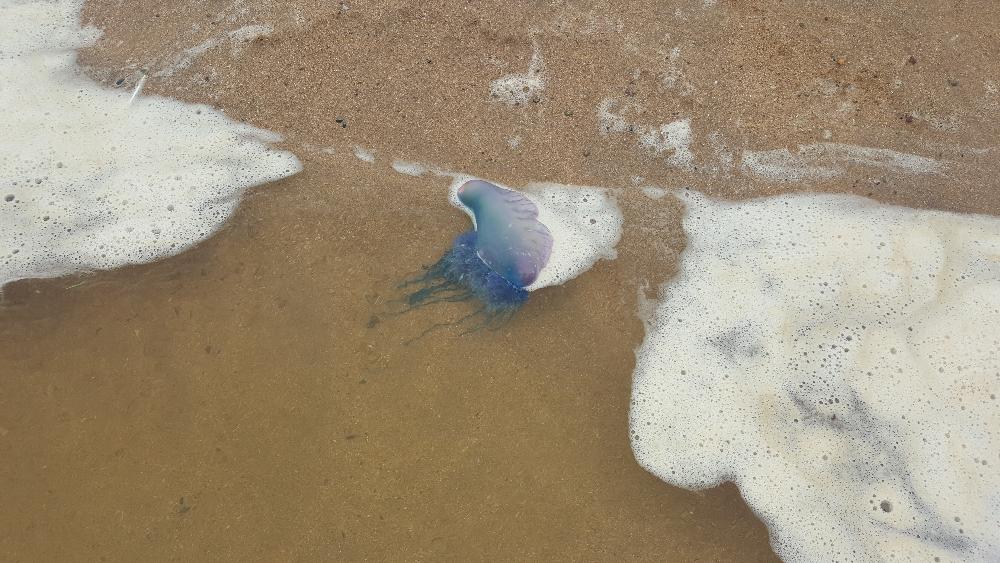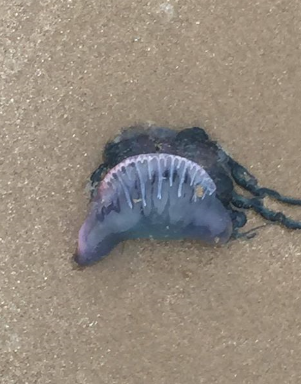Reports of Infamous Portugese Man 'o War Spotted on Freshwater East (and other) beaches in Pembrokeshire...
Here's a bit of interesting info from Wikipedia!
"The Portugese Man 'o War is a marine hydrozoan of the family Physaliidae found in the Atlantic, Indian and Pacific Oceans. Despite its appearance, the Portuguese man o' war is not a true jellyfish but a siphonophore, which is not actually a single multicellular organism (true jellyfish are single organisms), but a colonial organism made up of many specialized animals of the same species, called zooids or polyps. These polyps are attached to one another and physiologically integrated, to the extent that they cannot survive independently, creating a symbiotic relationship, requiring each polyp to work together and function like an individual animal."

How amazing is that??
Basically, it's an air sack with stinging tentacles...
The stinging polyps dangle beneath the air sack that floats on the water surface. At the top of the air sack there's a rigid 'sail' that catches the wind and they move around the oceans by wind power.
They can contract the air sack a bit, to move the 'sail', if you see one on the beach and it's still alive watch it closely and you will see the sack contracting and relaxing as the wind blows on it. But other than that they're at the mercy of the wind and often get blown on shore during October in stormy conditions.
The good news is: as they float on the surface of the water they can be seen if you are swimming.
If like me you like swimming in the autumn, if there have been sightings then stay well clear of anything you see floating on the surface including tangles of seaweed or driftwood, which may also have one of these tangled inside. The stingers can extend for quite a few metres (up to 20m if it's a large one) so sight regularly and avoid rough conditions when they're around that may inhibit how far/well you can see.

Autumn is a fantastic month for sea swimming. The water is still warm and the visbility is often superb. Don't sightings and the hysteria that goes with it put you off going in, but be aware. This is one time when social media can help - you will invariably get to hear they're around very quickly.
What Do I Do if I Get Stung?
Generally the advice is the same as for all jellyfish related stings:
- Don't use your hands to remove the stingers, use a twig, bit of seaweed, a pebble, or anything at hand.
- Don't scratch or rub the affected area as this will trigger more stings.
- Flush the affected area with sea water, not freshwater, which can apparently aggravate the sting.
- Put the affected area in hot water as soon as you can - as hot as you can handle - until the pain subsides. If it's not possible to submerge the area, then soak a cloth in hot water and use that. For this reason, it may be advisable, especially if Portugese Man 'o Wars have been spotted, to carry a thermos of hot water in your car/beach bag. (Tip: do this by default - hot water is the go-to cure for all jelly fish stings).
- Seek medical attention to be safe, especially if you feel feint or experience respiratory difficulties.
Avoidance is the best strategy. Just use a bit of common sense and be careful.
There were a load washed up in beaches in the western UK in 2018 too, and now 2019, so it does look like they can potentially (not always) be considered as a regular visitor as they get blown onto western UK shores following big storms around the Azores during the autumn months; but in truth they usually go as quickly as they appear and they're never here for more than a week or two.
Accept them for what they are but give them the respect they deserve. Check them out if you see one on land and appreciate their beauty, they're really quite amazing creatures!
